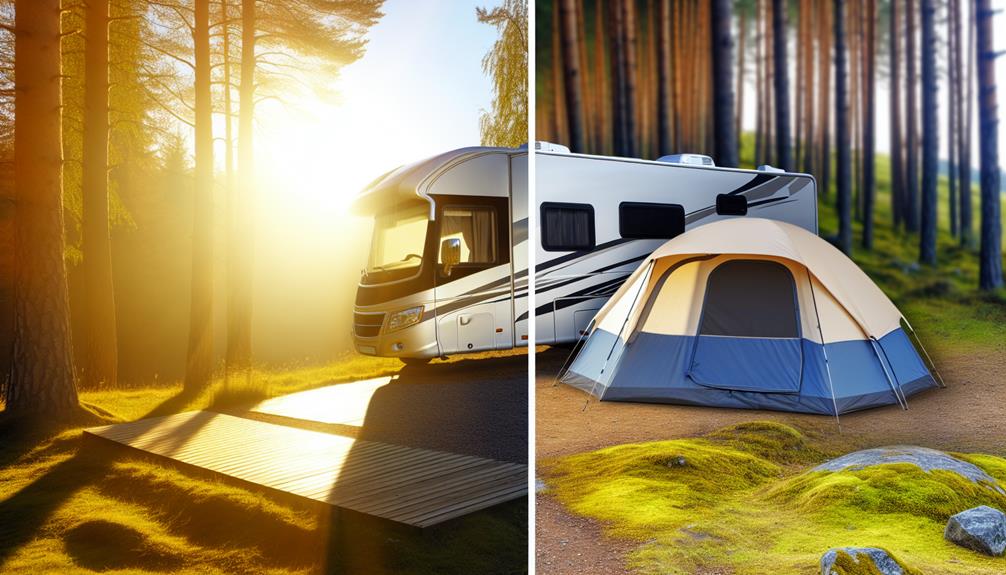In the realm of outdoor accommodations, the debate between the safety of RVs versus tents is a topic that warrants a closer look. While both offer shelter, the question remains: which provides a higher level of security and protection in the great outdoors?
Factors such as wildlife encounters, weather resilience, security features, and emergency readiness play pivotal roles in determining the safety of one over the other.
By analyzing these aspects, a clearer picture emerges of whether RVs truly offer a safer retreat compared to their canvas counterparts.
Key Takeaways
- RVs provide better protection against wildlife encounters due to solid walls and doors.
- RVs offer superior weather protection with insulation benefits and advanced waterproofing.
- RVs have enhanced security measures like locking mechanisms and surveillance systems.
- RVs are more equipped for emergency preparedness with first aid kits and communication devices.
Wildlife Encounters
When comparing the safety of RVs versus tents in terms of wildlife encounters, statistical data indicates a notable difference in risk levels between the two types of accommodation. RVs provide a more secure barrier against potential wildlife interactions compared to tents due to their solid walls and doors. While tents offer minimal protection, RVs offer a higher degree of safety from wildlife such as bears, snakes, and other potentially dangerous animals commonly encountered in camping areas.
Utilizing animal deterrents, such as bear spray or noise-making devices, can further reduce the risk of wildlife encounters in both RVs and tents. However, the effectiveness of these deterrents may vary depending on the type of accommodation. In RVs, the enclosed space and sturdy construction offer an additional layer of protection that tents do not provide. Campsite noise, generated naturally by RV occupants or through electronic devices, can also serve as a deterrent to wildlife, potentially reducing the likelihood of close encounters.
Ultimately, the structural advantages of RVs and the ability to create campsite noise contribute to a safer camping experience in terms of wildlife encounters compared to tents.
Weather Protection
In evaluating the safety benefits of RVs versus tents concerning weather protection, the structural design and materials of the accommodation play a crucial role in mitigating environmental elements.
RVs typically offer superior weather protection compared to tents due to their insulation benefits and waterproofing options. Insulation in RVs helps regulate internal temperatures, keeping occupants comfortable in varying weather conditions. This feature is particularly advantageous during extreme temperatures, providing a buffer against both heat and cold.
Additionally, RVs often come equipped with advanced waterproofing options such as weather-sealed windows, durable roofing materials, and water-resistant walls, reducing the risk of leaks and water damage during rain or snow. These elements collectively contribute to a safer and more weather-resistant shelter compared to traditional tents.
When considering weather protection, the construction and features of RVs significantly enhance the overall safety and comfort of occupants, making them a preferred choice for those seeking reliable protection from the elements.
Security Measures
Considering the structural integrity and design features of RVs, the discussion now shifts towards examining the security measures implemented in these accommodations for enhanced safety. RVs often come equipped with advanced security features to ensure the well-being of occupants. Here are some key security measures commonly found in RVs:
- Locking Mechanisms: Most RVs are fitted with secure locking mechanisms on doors and windows, providing a barrier against unauthorized entry. These locks are often sturdier than those on tents, enhancing security significantly.
- Surveillance: Many modern RVs are pre-installed with surveillance systems that include cameras and sensors. These systems can deter potential intruders and provide occupants with peace of mind by allowing them to monitor their surroundings.
- Alarm Systems and Lighting: RVs often feature alarm systems that can alert occupants in case of a security breach. Additionally, exterior lighting around the RV can help deter intruders and improve visibility during nighttime, enhancing overall safety. These features collectively make RVs a more secure option compared to tents when it comes to camping accommodations.
Emergency Preparedness
Effective emergency preparedness is paramount in ensuring the safety and well-being of individuals in recreational vehicles (RVs). One key aspect of emergency preparedness is having a well-equipped first aid kit readily available. This kit should include essential items such as bandages, antiseptic wipes, pain relievers, and other medical supplies to address potential injuries or health concerns while on the road. Additionally, establishing effective communication strategies is crucial in emergency situations when immediate assistance is needed.
To further highlight the importance of emergency preparedness in RV travel, consider the following table:
| Emergency Preparedness Items | Description |
|---|---|
| First Aid Kit | Includes bandages, antiseptic wipes, pain relievers, etc. |
| Emergency Contact List | Names and numbers of local emergency services and contacts |
| Communication Devices | Cell phone, two-way radios, or satellite phone for connectivity |
Overall Safety Comparison
Given the importance of emergency preparedness in RV travel, examining the overall safety comparison between RVs and tents becomes a critical analysis in ensuring optimal safety measures for outdoor enthusiasts.
When comparing the overall safety of RVs and tents, several key factors come into play:
- Structural Stability: RVs generally offer better structural stability than tents. The solid construction of an RV provides protection against external elements such as strong winds and heavy rain, reducing the risk of collapse or damage compared to tents.
- Fire Hazards: RVs are equipped with safety features like smoke detectors, fire extinguishers, and fire-resistant materials, minimizing the risk of fire hazards. Tents, on the other hand, are more susceptible to accidental fires from cooking equipment or open flames, posing a higher fire risk.
- Security: RVs offer better security features such as lockable doors and windows, providing a safer environment compared to tents, which are more susceptible to unauthorized access and wildlife encounters.
Frequently Asked Questions
What Are the Best RV Models for Families With Young Children?
When considering the best RV models for families with young children, focus on RV safety features like collision avoidance systems and sleeping arrangements such as bunk beds or convertible dinettes. Look for designs that prioritize both safety and comfort for family travels.
Are There Any Specific Regulations or Laws Regarding Where RVs Can Park Overnight?
RV parking restrictions vary by location. Many jurisdictions have overnight camping laws that prohibit parking in certain areas. It's crucial for RV owners to research local regulations to avoid fines and ensure compliance with specific parking restrictions.
How Can I Properly Store Food to Prevent Attracting Wildlife While Camping in an Rv?
To prevent attracting wildlife while camping in an RV, proper food storage is crucial. Utilize airtight containers, coolers, and bear-proof containers. Follow camping etiquette and local regulations. Minimize odors by sealing food tightly and disposing of waste properly to ensure wildlife safety.
Are There Any Recommended First Aid Kits or Emergency Medical Supplies to Keep in an Rv?
In the realm of outdoor safety, having a well-equipped wilderness first aid kit in your RV is as crucial as a compass in the wilderness. Stocking up on essential emergency medical supplies can be life-saving.
What Are Some Common Maintenance Issues to Be Aware of When Owning an Rv?
When owning an RV, staying proactive with preventative maintenance is key. Regularly inspecting the roof, tires, brakes, and electrical systems can help avoid common issues. Troubleshooting early signs of wear can prevent costly repairs. Safety tips and emergency preparedness are essential.
Conclusion
In conclusion, when comparing the safety of RVs and tents, RVs offer a higher level of protection against wildlife encounters, adverse weather conditions, and security threats. Additionally, RVs provide better emergency preparedness measures compared to tents.
According to a study by the National Highway Traffic Safety Administration, RVs are involved in fewer accidents per mile traveled than passenger vehicles, further highlighting their safety advantages over tents.

